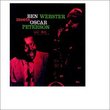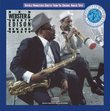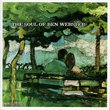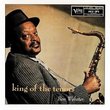| All Artists: Ben Webster Title: See You at Fair Members Wishing: 2 Total Copies: 0 Label: Universal Japan Release Date: 7/12/2004 Album Type: Import Genres: Jazz, Pop, Broadway & Vocalists Styles: Swing Jazz, Traditional Jazz & Ragtime, Oldies, Traditional Vocal Pop Number of Discs: 1 SwapaCD Credits: 1 |
Search - Ben Webster :: See You at Fair
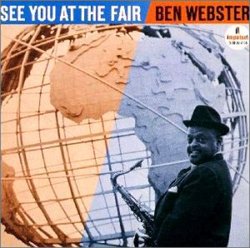 | Ben Webster See You at Fair Genres: Jazz, Pop, Broadway & Vocalists
Japanese reissue of the jazz act's 1964 album. Impulse. 2004. |
Larger Image |
CD DetailsSynopsis
Album Description Japanese reissue of the jazz act's 1964 album. Impulse. 2004. Similar CDs
|
CD ReviewsWebster's Best Studio Work Charles Loughrin | Paw Paw, Michigan United States | 11/29/2000 (5 out of 5 stars) "I first heard "See You At The Fair" when I was a kid in the 60's on my dad's LP. I was quickly a Ben Webster fan, and became familiar with his works from the 40's through the 60's. This album is his best work, with delicious versions of Over The Rainbow and In A Mellowtone. Webster's ability to express such a sensuous breathy tone through his horn is unique among jazz tenors, and this album shows his maturity in his career. There are no second-rate cuts on this CD. It is pure Webster; it is the reason that I became a jazz tenor sax player. Enjoy!" Gentle music for a quite evening James | Indianapolis, IN United States | 03/23/2007 (5 out of 5 stars) "This is a beauty from an "old master". Most of the tunes are very gentle like rain drops against leaves on a cool spring evening. Only "See You at the Fair" is the exception. I am especially fond of Webster's refined interpretation of "The Single Petal of a Rose" by Duke Ellington, which I understand was not on the original release (Why?). "See You...", along with "Soulville" and "Ben Webster Meets Oscar Peterson", is a great introduction to jazz saxophone music for special people in your life that are reluctant to listen to jazz. I think anyone would enjoy these Webster classics regardless of musical taste." A Webster beauty Bomojaz | South Central PA, USA | 12/30/2006 (5 out of 5 stars) "Recorded in 1964, this was Ben Webster's last recording done in America before moving to Europe, where his career witnessed a resurgence, and it's a beauty. Ben's tone is strong and vibrant, and he's as lyrical as ever. The opening track is a real lapel-grabber - a medium-up blues that gives everyone a taste solo-wise. Roger Kellaway on piano is especially inventive on this tune (SEE YOU AT THE FAIR). OVER THE RAINBOW and STARDUST are taken as very slow ballads; Webster's RAINBOW is just about definitive. SOMEONE TO WATCH OVER ME is also a slow ballad with beautiful Webster, and pianist Hank Jones takes a terrific solo here, too. WHILE WE'RE DANCING is an attractive bossa nova, and Ben is at his raspy, sexy best on the medium-tempo FALL OF LOVE. This is a must-have CD for Ben Webster fans."
|

 Track Listings (12) - Disc #1
Track Listings (12) - Disc #1